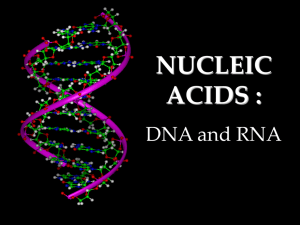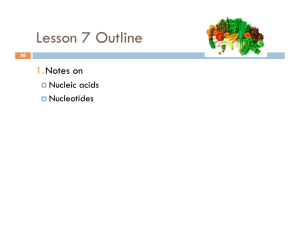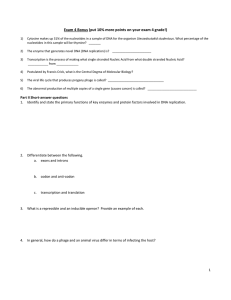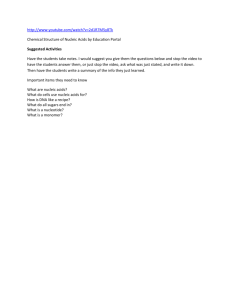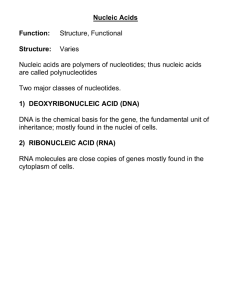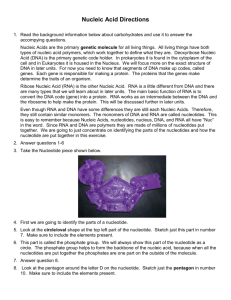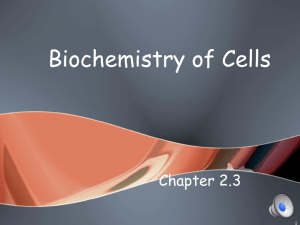Nucleotides and Nucleic Acids DR NAZIA KHAN ASSISTANT PROFESSOR COLLEGE OF MEDICINE
advertisement
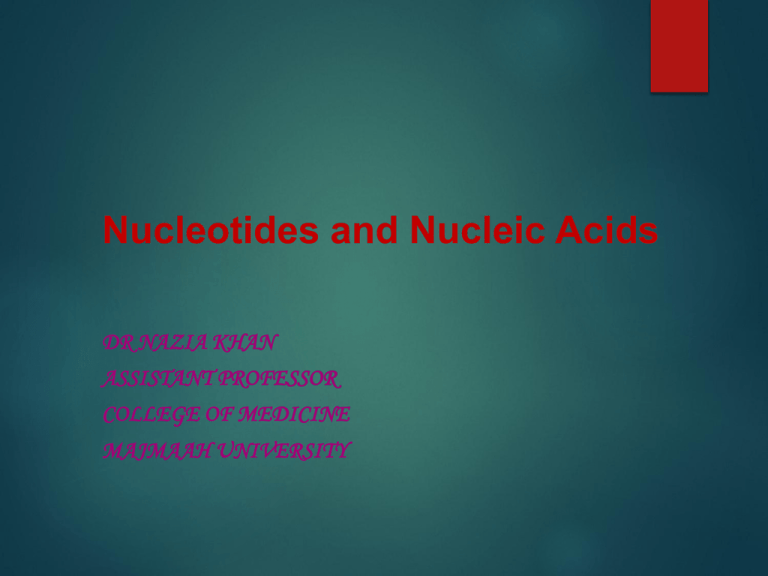
Nucleotides and Nucleic Acids DR NAZIA KHAN ASSISTANT PROFESSOR COLLEGE OF MEDICINE MAJMAAH UNIVERSITY Definitions Nucleic acids are polymers of nucleotides • Nucleotides are carbon ring structures containing nitrogen linked to a 5carbon sugar (a ribose) • 5-carbon sugar is either a ribose or a deoxy-ribose making the nucleotide either a ribonucleotide or a deoxyribonucleotide In eukaryotic cells nucleic acids are either: 1. Deoxyribose nucleic acids (DNA) 2. Ribose nucleic acids (RNA) • Messenger RNA (mRNA) • Transfer RNA (tRNA) • Ribosomal RNA (tRNA) Nucleic Acid Function DNA • Genetic material - sequence of nucleotides encodes different amino acids RNA • Involved in the transcription/translation of genetic material (DNA) • Genetic material of some viruses Nucleotide Function • Building blocks for DNA and RNA • Intracellular source of energy - Adenosine triphosphate (ATP) • Second messengers - Involved in intracellular signaling (e.g. cyclic adenosine monophosphate [cAMP]) • Intracellular signaling switches (e.g. G-proteins) Nucleotide Structure • Despite the complexity and diversity of life the structure of DNA is dependent on only 4 different nucleotides • Diversity is dependent on the nucleotide sequence • All nucleotides are 2 ring structures composed of: o 5-carbon sugar : b-D-ribose (RNA) b-D-deoxyribose (DNA) o Base Purine Pyrimidine o Phosphate group A nucleotide WITHOUT a phosphate group is a NUCLEOSIDE Nucleotide Structure - 1 Sugars HOCH2 Generic Ribose Structure OH O Ribose 5’ HOCH2 O OH 4’ OH 1’ 3’ 2’ HOCH2 OH O N.B. Carbons are given numberings as a prime Deoxyribose OH H Nucleotide Structure - 2 Bases - Purines NH2 N Adenine N A N N 6 7 5 9 4 8 N 3 N H 1N 2 O N N Guanine NH G N H N NH2 Nucleotide Structure - 3 Bases - Pyrimidines O Thymine H3C NH T N 4 3 5 2 6 1 N O H NH2 N N C Cytosine N H O Nucleotide Structure - 4 Bases - Pyrimidines • Thymine is found ONLY in DNA. • In RNA, thymine is replaced by uracil • Uracil and Thymine are structurally similar Uracil 4 3 5 2 6 1 N O N NH U N H O Nucleotide Structure - 4 Phosphate Groups • Phosphate groups are what makes a nucleoside a nucleotide • Phosphate groups are essential for nucleotide polymerization Basic structure: O O P O O X Nucleotide Structure - 4 Phosphate Groups Number of phosphate groups determines nomenclature o Monophosphate e.g. AMP O O o Free = inorganic phosphate(Pi) P O CH2 O O o Free = Pyro- phosphate (PPi) O O o Diphosphate e.g. ADP P O O P O O CH2 Nucleotide Structure - 4 Phosphate Groups Triphosphate e.g. ATP O No Free form exists O O P O O P O O O P O O CH2 Nucleotide Structure - 4 Base-Sugar-PO424 3 2 O O P O O 1 N 5’ C O 4’ 1’ 3’ 2’ OH Monophosphate 5N 6 Nucleic Acid Structure Polymerization P P P P N P C P N C S S Phosphodiesterase P + P P (PPi) P P P N C S N C S Nucleic Acid Structure Polymerization Nucleotide Sugar Phosphate “backbone” Nucleic Acid Structure Polymerization 3’ 5’ Sugar Phosphate “backbone” Bases A T 5’ C G 3’ TAGCAC A C Nucleic Acid Structure “Base Pairing” • RNA [normally] exists as a single stranded polymer • DNA exists as a double stranded polymer • DNA double strand is created by hydrogen bonds between nucleotides • Nucleotides always bind to complementary nucleotides A T (2 H-bonds) G C (3 H-bonds) Nucleic Acid Structure “Base Pairing” Nucleic Acid Structure “Base Pairing” • RNA is [usually] single stranded • Base pairing can occur in RNA but is usually within the same strand Nucleic Acid Structure “Base Pairing” DNA base-pairing is antiparallel i.e. 5’ - 3’ (l-r) on top : 5’ - 3’ (r-l) on 5’ 3’ T A 3’ A T G C C G A T C G 5’ Nucleic Acid Structure Antiparallel Base Pairing Why antiparallel DNA base-pairing? - Need to shield the genetic information - Is the only conformational structure to allow double helix formation Nucleic Acid Structure The double helix • First determined by Watson & Crick in 1953 • Most energy favorable conformation for double stranded DNA to form • Shape and size is uniform for all life (i.e. DNA is identical) • Without anti-parallel base pairing this conformation could not exist • Structure consists of “major” grooves and “minor” grooves • Major grooves are critical for binding proteins that regulate DNA function Nucleic Acid Structure The double helix Minor Groove Major Groove phosphate sugar phosphate phosphate sugar base base sugar base sugar base phosphate nucleoside nucleotides sugar base nucleic acids References: Lippincott’s Illustrated biochemistry : Harper’s illustrated biochemistry
